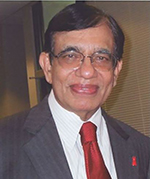
LIFESTYLE: Your Best Medicine - Part I

“Let food be thy medicine,” is a famous quote attributed to Hippocrates, the father of medicine. This mantra captures the central role of nutrition and dietary patterns in human health. In other words, if you eat the right diet, it can maintain your health helping you to prevent or reduce the symptoms or even reversing major diseases. There are, of course, many other factors that influence health and longevity.
Let me start with three sad but truestories. A 65-year-old lady comes to see me because of chronic cough and then a touch of blood in the sputum. It turns out she has developed lung cancer from chronic cigarette smoking. A 52-year-old man collapses with a heart attack while working in the yard and dies. He was quite obese, hypertensive and diabetic. A physician, 70, a chronic alcohol user, suffering from cirrhosis of liver, develops cancer of liver and dies. Could these tragedies have been prevented? The answer is ‘yes’ because they have a lot to do with an unhealthy lifestyle.
There has been spectacular progress in medicine during the past two decades. We understand the mechanisms of most serious diseases now and there are preventive or treatment measures for all. Yet, people continue to suffer from these diseases, preventable to a large extent. The key factor here is ‘healthy lifestyle.’Although, life expectancy has risen in the U.S. in the past, lately there has been a drop – falling to about 78 from the previous high of 80. There are many other countries like Japan, Hong Kong, Switzerland, Spain, Australia, etc., that have much higher life expectancies. So, it’s time that we delve deep into this issue and seek some solutions.
Have you heard about ‘blue zones,’ a designation for places of exceptional longevity? These are areas where people live longer and lead healthier lives than anywhere else on the planet. Blue zone regions are Ikaria, an island in Greece; Okinawa, an island in Japan; the Sardinia in Italy; Loma Linda, a small city in California; and the Nicoya peninsula in Costa Rica. As incredible as it is, the people here generally live much longer … like into the 90s and many to 100 or better. And they are quite active too in their old age and often do not suffer from many chronic diseases common in the industrialized world.
What are the special characteristics of those living in blue zone? During a recent vacation to Crete Island, off the coast of Greece, my friend, Dr. Venugopal, a senior cardiologist from West Palm Beach, observed one thing. Crete is close to Ikaria and people here also share much of the same features of inhabitants of Ikaria, especially in the quality and longevity of life. There were many older people walking along the roads and they appeared to be reasonably healthy. He thought, maybe not many own a vehicle, hence they are walking. Hardly there was anybody who is overweight or obese. When asked why they are walking, they said, they prefer not to use their cars for short distance and they like to park their cars at the end of the road and walk the distance to the shopping centers or to their destinations. After dinner, they have a ritual of all family members dancing in their front yard or going for a slow walk. This gentle exercise helps to digest the food and reduces the post-prandial rise of blood sugar, and hence beneficial to diabetics. This goes along with the old Indian saying, “Walking 100 steps after supper is good for health.” Now, you know why. All these add up.
What is this sudden interest in lifestyle? According to the World Health Organization, 80 percent of heart disease, stroke and Type 2 diabetes and 40 percent of cancer could be prevented, with improvements to diet and lifestyle. “Lifestyle medicine has now become a medical specialty that uses therapeutic lifestyle interventions as a primary modality to treat or prevent chronic conditions including, but not limited to, cardiovascular diseases, Type 2 diabetes, obesity, many gastrointestinal diseases and more. Now, we have an entirely new medical organization called “American College of Lifestyle Medicine” with certified clinicians who are trained to apply evidence-based, whole-person, prescriptive lifestyle changes to treat and, when used intensively, often reverse such conditions. Fascinating, right?
M.P. Ravindra Nathan, M.D., is a cardiologist and Emeritus Editor of AAPI Journal. For further reading, “Second Chance - A Sister’s Act of Love” by Dr. Nathan from Outskirts Press, can be found at www.amazon.com